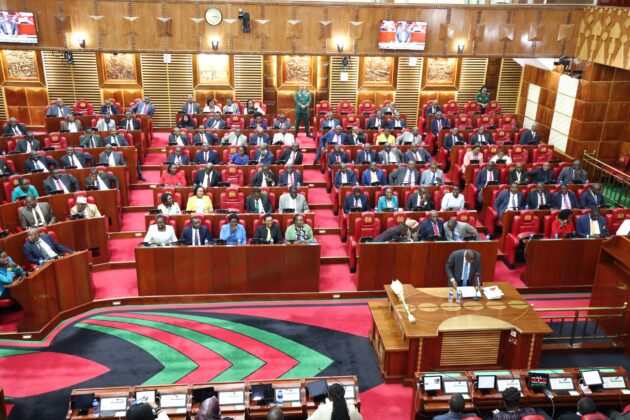
MPs Demand annual review of SHIF Cover Limits » Capital News
NAIROBI, Kenya, Feb 11 – Members of Parliament have called for timely annual reviews of the various cover limits under the Social Health Insurance Fund (SHIF) to ensure patients receive adequate medical services.
Legislators raised concerns over the capping of medical services, particularly for renal and dental care, arguing that the limits are insufficient compared to the actual costs incurred at different medical facilities.
Medical Services Principal Secretary Harry Kimutai revealed that the capping for optical services is set at Sh1,000 per family per year, with eligibility restricted to children under 18 years.
For oral health services, the limit is Sh2,000, while essential outpatient services—including laboratory investigations, imaging, prescription medication, vaccinations, management of mental health conditions, wellness programs, and counseling—are capped at Sh900 per beneficiary.
The cover also provides for Sh10,000 for normal delivery and essential newborn care, Sh30,000 for Caesarean section and essential newborn care, and Sh10,650 per week for renal care therapies such as haemodialysis.
Peritoneal dialysis is covered at Sh85,200 per month, with members required to top up any excess amounts beyond the cover limit.
Nyeri Town MP Duncan Mathenge questioned the feasibility of the current dental and optical cover limits, arguing that they are inadequate for family needs.
“For dental care, the cap is Sh2,000 per year, which only covers tooth extraction. This is unacceptable because modern dentistry focuses on saving teeth rather than extractions,” Mathenge stated.
The MP also raised concerns over the ministry’s preference for referring patients to hospitals in India for overseas treatment, rather than allowing them to choose their preferred hospitals. He alleged possible collusion between ministry officials and Indian hospitals.
“Mr. PS, explain why patients are being directed to specific hospitals facilitated by SHA. My own mother required endocrine services, and despite requesting treatment at a different hospital, we were denied. We had to pay out of pocket to take her to a hospital of our choice,” Mathenge lamented.
Committee Chair Robert Pukose questioned how the ministry arrived at the Sh1,000 cap for optical care and sought clarity on who is responsible for selecting the hospitals that Kenyans can visit abroad.
“Who is in charge of empaneling these hospitals? We do not want a situation where ministry officials collude with hospital administrators to create preferential arrangements,” Pukose noted.
Kitutu Chache South MP Anthony Kibagendi accused the PS of denying patients access to overseas treatment due to bureaucratic delays in forming review committees.
“I am not convinced that SHA is functioning as intended. In reality, SHA is frustrating patients who need medical treatment abroad,” he argued.
Mogotio MP Reuben Kiborek raised concerns that the Sh500,000 cap for overseas treatment is insufficient to cover medical bills for patients seeking specialized services abroad.
Seme MP James Nyikal urged the PS to ensure that the capping limits are reviewed annually to reflect market rates and the actual cost of medical services.
The legislators emphasized the need for transparency and fairness in determining medical service limits and the selection of overseas treatment facilities to ensure Kenyans receive the best possible healthcare options.
Patient forced to pay out of pocket
Meanwhile, patients seeking treatment for chronic and critical illnesses in public hospitals are being forced to pay out-of-pocket due to ongoing government financial constraints.
The funding shortfall has disrupted healthcare services across level two to level six hospitals, with Kimutai acknowledging that SHIF remains only partially operational—currently covering emergency services for the first 24 hours after admission.
“At present, the fund provides coverage for urgent care, resuscitation, and stabilization for specific emergency services as outlined in the Gazetted benefit package,” he stated.
He added that these services remain free for the first 24 hours, funded by the Exchequer. However, due to financial limitations, the chronic and critical illness components of SHIF have yet to be activated.
Despite the transition from the defunct National Health Insurance Fund (NHIF) to SHIF in October 2023, emergency, chronic, and critical illness packages were only partially implemented in December—covering emergency services in level five and six hospitals. The delay has left many patients stranded, with some turned away due to confusion over SHIF’s implementation and budgetary constraints.
“The system for these specific services was only activated in December, starting with level five and six hospitals. As a result, claims only began coming in at the end of December,” explained Tracy John, the acting director for benefits and claims management.
Anthony Lenaiyara, CEO of the Digital Health Agency, revealed that as of January, 21.6 million claims had been submitted under the fund, which was allocated Sh2 billion in the current financial year.
“This includes cases such as cardiac and pulmonary arrest, major trauma,” he noted, emphasizing the strain on the healthcare system caused by the funding gap.